- Home
- Julian Barnes
Before She Met Me Page 5
Before She Met Me Read online
Page 5
‘No. Anyway, you can’t do that. I’d never believe her when she told the truth.’
‘Suppose not.’ Jack thought he’d been very patient. He’d scarcely talked about himself for a long time. ‘It’s all a bit rarefied for me. Won’t make a short story, I’m afraid.’ It was odd how much people, even friends, imposed on you: just because you were a writer, they assumed you’d be interested in their problems.
‘So you’ve no suggestions?’ And then—having told you they don’t want advice, of course they do.
‘Well, if it was me, I expect I’d go out and bang some tart for a cure.’
‘Are you serious?’
‘Perfectly.’
‘How would that help?’
‘You’d be surprised how that helps. Cures everything. Everything from a mild headache to writer’s block. Very good for curing rows with the wife too.’
‘We don’t have rows.’
‘Not at all? Well, I’ll believe you. Sue and I row quite a bit. Always have—apart from the palmy days, of course. But then, we didn’t bother to make the bed in the palmy days; only rowed about who should go on top.’ Graham’s glasses had cleared; he could see Jack taking breath for anecdote. He should have remembered that Jack’s attention, however protracted, was always conditional.
‘With Valerie—don’t think you ever met Val, did you?—I used to have rows all the time. Still, that was twenty years ago. But we used to have rows right from the start. Not your sort of milieu, old cunty; it was all Room at the Top and A Kind of Loving stuff. Hand up in the bus shelters. Trying to unsnap a suspender with two frozen fingers of your left hand when you’re right-handed, while pretending you’re really just stroking her thigh, and kissing her at the same time, and dropping your other mitt over her right shoulder and feeling for goodies. Makes it sound like bloody Clausewitz, doesn’t it? Not too far wrong, either, now I come to think of it.
‘So, first we’d have rows about where I put my hand when, how many fingers and so on. Then we finally had the Normandy landings, and I thought, well, okay, now the rows will stop. But they didn’t; instead we had rows about how often, and when and where, and is that a fresh packet, Jack, will you please check the date on the side. Can you imagine—switching on the light in the middle to check the date on the packet?
‘And after the Normandy landings, of course, we had the Battle of the Bulge. After we got married, of course. Then it was, should we, shouldn’t we, why don’t you get a proper job, look at this knitting pattern, and Margaret’s had three already. Five or six years of that was enough, I can tell you. Buggered off down here.’
‘What happened to Valerie?’
‘Oh, Val, she married a teacher. Bit of a wet-panter, nice enough. Likes the kids, which is useful for me. Checks the date on the packet every time, I’m sure.’
Graham wasn’t sure where Jack was leading, but he didn’t mind too much. He’d never been let into Lupton history before: Jack’s declared policy of living only in the present involved a stylized forgetting of the past. If asked about his early life, he would either refer you to his fiction, or invent a baroque lie on the spur of the moment. Of course, there was no knowing whether he wasn’t even now trimming a myth to fit Graham’s particular needs. Though always frank, the novelist was never wholly sincere.
‘I thought I’d left the rows behind, up there with Val. When I met Sue, I thought, this is nice. No problem with the Normandy landings; well, there wouldn’t have been—it was a dozen years later and London, and they’d built the bloody Channel tunnel by then, old matey, hadn’t they? And Sue seemed less spiky than Val, at first. So we got married, and then, after a bit, guess what, the rows started. She’d begin by asking me what my role was, stuff like that. And I’d say, I’d like a role in bed with a little honey, please. And then we’d have a big row and I’d go off and have a bit of consolation, and then I’d come back and we’d have a row about that, so eventually I thought, well maybe it’s me. Maybe I’m unlivable with. That was when we thought it would be better if I had the flat in town and she lived in the country. Well, you remember that—it was only a few years ago.’
‘And?’
‘And, guess what? We have just as many rows as before. Well, fewer in one sense, I suppose, because we see less of each other. But I’d say the number of rows per hour of contact with each other has remained completely stable. And we’ve got particularly good at having shouting matches on the phone. We have big rows about as often as when we lived together. And when we do, I take exactly the same course afterwards. I ring up an old girlfriend and get me some consolation. It always works. That’s the thing I’ve discovered about what for want of a better word we may as well call adultery. It always works. If I were you, I’d go off and find myself a nice married woman.’
‘Most of the women I’ve slept with have been married,’ said Graham. ‘To me.’ He felt depressed. He hadn’t come to hear a version of Jack’s life story; though he certainly hadn’t minded hearing it. Nor had he come to learn about Jack’s own private remedies. ‘You’re not seriously suggesting I go off and commit adultery?’
Jack laughed.
‘Course I am. Second thoughts, course I’m not. You’re much too much of a guilt-ridden granny for that. And you’d be bound to go straight home to Ann and blab it out on her shoulder, and that wouldn’t do either of you any good or solve anything. No, all I’m saying is, that is your cross-eyed bear. Every marriage has a cross-eyed bear, and this is yours.’
Graham looked blankly at him.
‘Cross-eyed bear. Cross You’d Bear? Cross I’d Bear? Okay? Fuckit, Graham, we’ve both been married twice, we’re both practically clear of brain damage, we both thought about the whole thing each time before plunging into it. Now, four marriages tell us the honey time can’t last. So what can you do about it? I mean, you don’t think your present situation is Ann’s fault, do you?’
‘Of course not.’
‘And you don’t think it’s yours?’
‘No—I suppose I don’t think about it in terms of fault.’
‘Of course not. Quite right too. It’s in the nature of the beast, that’s what it is. It’s in the nature of marriage. It’s a design fault. There’ll always be something, and the best way to survive, if you want to survive, is identify it, isolate it, and always make a particular response to it when it occurs.’
‘Like you calling up an old girlfriend.’
‘Sure. But you won’t want to do that.’
‘I can’t think of anything relevant I might want to do. All I want to do is take a holiday from being inside my head.’
‘Well, there are ways. Do something irrelevant if you like, but do it seriously. Have a wank, get drunk, go and buy a new tie. Doesn’t matter what it is, just as long as you have some way of fighting back. Otherwise it’ll get you down. Get you both down.’
Jack thought he was really doing quite well. He wasn’t used to acting as a problem page, and he’d been fairly convinced by the plot structure he’d presented to Graham at such short notice. He’d managed to impose some sort of pattern on both their lives as he went along. Still, that was his job, after all, wasn’t it: smelting order out of chaos, rendering fear and panic and agony and passion down into two hundred pages and six quid ninety-five. That was what he was paid to do, so this wasn’t too hard a sideline. The percentage of lying was about the same as well.
Graham decided, though without much optimism, to think over what Jack had said. He’d always considered Jack more experienced than himself. Was he? They’d both been married twice, they’d both read about the same amount, they were of about the same intelligence. So why did he consider Jack an authority? Partly because Jack wrote books, and Graham respected books in both an abstract and a practical way, acknowledged a gut deference to their jurisdiction. And partly because Jack had had millions of affairs; always seemed to have a new girl in tow. Not that this necessarily made him an authority on marriage. But then, who was? Mickey Rooney? Zsa Z
sa Gabor? Some Turkish sultan or other?
‘Or … ‘ said Jack. He was rubbing his beard and looking almost as serious as he could.
‘Yes …?’
‘Well, there’s always one solution …’ Graham sat up straighter in his chair. This was what he’d come for. Of course, Jack would know what to do, would know the right answer. That was why he’d come here; he knew he was right to come. ‘… You should love her less.’
‘What?’
‘Love her less. May sound a bit old-fashioned, but it’d work. You don’t have to hate her or dislike her or anything —don’t go over the edge. Just learn to detach yourself a little. Be her friend if you like. Love her less.’
Graham hesitated. He didn’t quite know where to begin. Eventually he said,
‘I cry when the houseplants die.’
‘Come again, squire?’
‘She had these African violets. I mean, I don’t like African violets much, and neither does Ann. I think she was given them. She’s got lots of other plants she likes a lot more. And they got sort of plant chicken pox or something, and they died. Ann didn’t mind at all. I went up to my study and cried. Not about them—I just found myself thinking about her watering them, and putting that fertilizer stuff on them, and, you know, not her feelings about the sodding plants—she didn’t really have any, as I said—but her time, her being there, her life …
I’ll tell you another thing. After she’s gone to work, the first thing I do is take out my diary and write down everything she’s got on. Shoes, tights, dress, bra, knickers, raincoat, hair-grip, rings. What colour. Everything. Often it’s the same, of course, but I still write it down. And then occasionally, throughout the day, I take out my diary and look it up. I don’t try and memorize what she’s looking like—that’d be cheating. I get out my diary—sometimes when I’m teaching and pretend to be thinking about essay titles or something—and I sit there, sort of dressing her. It’s very … nice.
‘I’ll tell you another thing. I always clear the table after dinner. I go through to the kitchen, and I scrape my plate off into the kitchen bin, and then I suddenly find myself eating whatever she’s left on hers. Often, you know, it isn’t anything particularly nice—bits of fat and discoloured vegetables and sausage gristle—but I just scoff it. And then I go back and sit down opposite her, and I find myself thinking about our stomachs, about how whatever I’ve just eaten might easily have been inside her, but’s inside me instead. I think, what an odd moment it must have been for that food, when the knife came down and the fork pushed it this way rather than that, and instead of lying inside you it’s lying inside me. And that sort of makes me feel closer to Ann.
‘And I’ll tell you another thing. Sometimes, she gets up in the night and has a pee, and it’s dark and she’s half asleep and she somehow—God knows how she does it, but she does—she misses the bowl with the piece of paper she dries herself with. And I’ll go in there in the morning and find it lying on the floor. And—it’s not knicker-sniffing or anything like that—I sort of look at it and I feel … soft. It’s like one of those paper flowers that bad comedians wear in their buttonholes. It seems pretty, and colourful, and decorative. I could almost wear it in my buttonhole. I pick it up and shove it back in the bowl, but I feel sentimental afterwards.’
There was a silence. The two friends looked across at each other. Jack sensed a belligerence in Graham; the confession somehow managed to be aggressive. Perhaps too there was a touch of self-satisfaction about the recital. Jack felt almost embarrassed—so rare an occurrence that he began reflecting on his own internal condition rather than Graham’s. Suddenly he became aware that his friend had stood up.
‘Well, thanks, Jack.’
‘Glad to be of any. If I was. Next time you need to give the old psychocouch a pounding just give me a buzz.’
‘Yes I will. Thanks again.’
The front door was shut. Each had gone about five yards, in opposite directions, when they both paused. Jack paused while he gave a little pivot, a sort of fly-half’s side-step in the middle of the hall. He farted, not very noisily, and commented to himself,
‘Gone With the Wind.’
Outside, Graham paused, sniffed the dusty privet and the overflowing dustbins, and made a decision. If he cut out going to the good butcher, and did all his shopping at the supermarket, he could slip into The Good Times on his way home and catch Ann committing adultery again.
FOUR
Sansepolcro, Poggibonsi
And then it began to spread.
One evening in late March they were sitting over a map of Italy and discussing their holiday. Side by side on the bench at the kitchen table: Graham had an arm loosely dangled round Ann’s shoulder. It was a comforting, marital arm, a tranquil parody of Jack’s urgent, front-row forward’s limb. Just looking at a map despatched Graham’s mind on suave imaginings; he remembered how holidays made each old, familiar pleasure come up smelling like clean laundry. Vallombrosa, Camaldoli, Montevarchi, Sansepolcro, Poggibonsi, he read off to himself, and already he was in a cicada-crackling dusk, a glass of Chianti in his left hand, and his right hand floating up the inside of Ann’s bare leg … Bucine, Montepulciano, and he was being woken by the raucous flutter of a pheasant landing heavily outside their bedroom window to gorge with impunity on the bursting figs … Then his eye tripped on
‘Arezzo.’
‘Yes, it’s nice there. I haven’t been for years.’
‘No. Yes, I mean, I know. Arezzo.’ Suddenly Graham’s lolling fantasies were over.
‘You haven’t been, have you, love?’ Ann asked him.
‘Don’t know. Don’t remember. Doesn’t matter.’ He stared back at the map, but it blurred as a tear eased itself into his left eye. ‘No, I was just remembering that you once told me you went to Arezzo with Benny.’
‘Did I? So I did. God, that feels years ago. It was, too. It must have been ten years at least. Probably in the Sixties. Think of that: in the Sixties.’ She was briefly jarred by pleasure at the thought that she had been doing interesting, grown-up things for such a length of time; for at least fifteen years, and she was still only thirty-five. A fuller, happier person now; and one still young enough not to flag at pleasure. She pressed closer to Graham on the bench.
‘You went to Arezzo with Benny,’ he repeated.
‘Yes. Do you know, I can’t remember anything about it. Is that where that great, sort of bowl-shaped square is? Or is that Siena?’
‘That’s Siena.’
‘Then Arezzo … that must be the place where … ’ She frowned, in disapproval of her bad memory as much as in an attempt to search it. ‘I can only remember going to the cinema in Arezzo.’
‘You went to the cinema in Arezzo,’ said Graham slowly, in the tone of one prompting a child, ‘and you saw a bad sentimental comedy about a whore who tries to disgrace the village priest, and then you came out and sat over an iced Strega in the only café you could find that was open, and you wondered as you drank how you could ever again live in a climate that was damp and cold, and then you went back to your hotel and you … screwed Benny as if you would never know greater pleasure, and you held nothing back from him, absolutely nothing, you didn’t even save a small corner of your heart and leave it untouched for when you met me.’
It was all uttered in a sad, hurt way, almost too precise to be self-indulgent. Was he putting it on? Was any of it a joke? As Ann looked across to check up, he went on,
‘I made up the last part of course.’
‘Of course. I never said anything like that to you, did I?’
‘No, you told me as far as the café, and I guessed the other things. Something about your expression told me the rest.’
‘Well, I don’t know if it’s true; I don’t remember. And anyway, Graham, I was twenty, twenty-one, I’d never been to Italy before. I’d never been on holiday with anyone who was as nice to me as Benny.’
‘Or had as much money.’
‘Or had
as much money. Is that wrong?’
‘No. I can’t explain it. I certainly can’t justify it. I’m glad you went to Italy. I’m glad you didn’t go alone; it might have been dangerous. I’m glad you went with someone who was nice to you. I’m glad—I suppose I have to be—that you went to bed with him there. I know it all in steps, I know the logic. All of it makes me glad. It just makes me want to cry as well.’
Ann said gently,
‘I didn’t know you then.’ She kissed him on the temple, and stroked the far side of his head, as if to calm the sudden turbulence inside. ‘And if I had known you then, I’d have wanted to go with you. But I didn’t know you. So I couldn’t. It’s as simple as that.’
‘Yes.’ It was simple. He gazed at the map, following the route he knew Ann had taken with Benny a decade before he had met her. Down the coast, through Genoa to Pisa, across to Florence, Rimini, Urbino, Perugia, Arezzo, Siena, back to Pisa and up again. Benny had just removed a great slice out of Italy for him. He might as well take a pair of scissors to the map, shear straight across it-from Pisa to Rimini, cut a parallel line through Assisi, and then stick the bottom bit of Italy back on to what was now left of the top bit. Make it into a mere bootee—the sort with little buttons down the side. As worn by posh whores; or so he imagined.
They could go to Ravenna, he supposed. He hated mosaics. He really hated mosaics. Benny had left him with the mosaics. Thanks very much, Benny.
‘We could go to Bologna,’ he said finally.
‘You’ve been to Bologna before.’
‘Yes.’
‘You went to Bologna with Barbara.’
‘Yes.’
‘You almost certainly slept in the same bed as Barbara in Bologna.’
‘Yes.’
‘Well, Bologna’s fine with me. Is it a nice place to go?’
‘I’ve forgotten.’
Graham stared at the map again. Ann stroked the side of his head, trying not to feel guilty about what she knew it would be foolish to begin feeling guilty about. After a few minutes’ contemplation Graham said quietly,

 The Sense of an Ending
The Sense of an Ending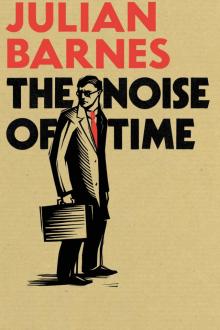 The Noise of Time
The Noise of Time Metroland
Metroland Letters From London
Letters From London Before She Met Me
Before She Met Me Pulse
Pulse Flaubert's Parrot
Flaubert's Parrot England, England
England, England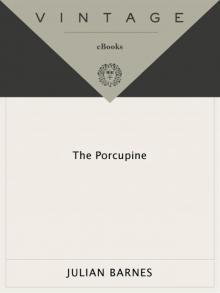 The Porcupine
The Porcupine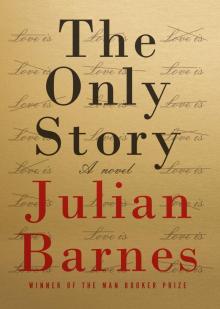 The Only Story
The Only Story Love, Etc
Love, Etc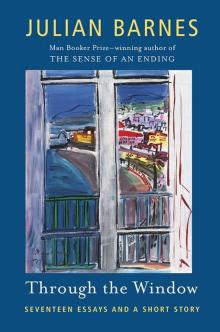 Through the Window: Seventeen Essays and a Short Story
Through the Window: Seventeen Essays and a Short Story Staring at the Sun
Staring at the Sun Cross Channel
Cross Channel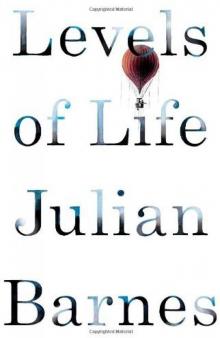 Levels of Life
Levels of Life Arthur & George
Arthur & George Love, Etc.
Love, Etc. A History of the World in 10 1/2 Chapters
A History of the World in 10 1/2 Chapters Something to Declare
Something to Declare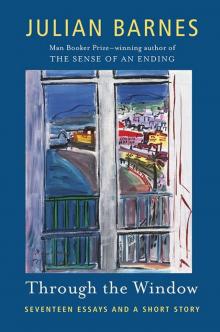 Through the Window: Seventeen Essays and a Short Story (Vintage International)
Through the Window: Seventeen Essays and a Short Story (Vintage International)